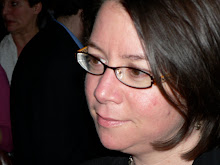========
Reflection
By Aaron
(SLOW.)
I remember my first thought when entered SJCS in second grade was “oh well. this‘ll take a while to get used to”. Now luckily, even though I entered in second grade, I still had a lot of time. That brings me to my first middah. Patience. This is one that not everyone masters. I think that one of the first times that I had to figure out how to use patience is when I first started learning Hebrew. What was really annoying about learning Hebrew was that everyone else seemed to know Hebrew, and I didn’t. I remember thinking, “why can’t everyone be as confused as me?”
As I went on in SJCS I noticed that everyone else was as confused as me, about different things. So and so doesn't understand a problem in math while so and so is confused about a concept in social studies. And in time, I began to see my own little chink in my armor. I didn’t like to sing alone, which, I’ll admit is a kinda wimpy phobia. When I did, everyone told me I sounded like an angel, but I didn't do it that often. So it put me halfway to a heart attack when I was called upon to do a solo in fourth grade.
(STOP FIDGETING HANDS)
That was my first experience of perseverance, hatmadah. I had to learn something I didn’t want to learn on my own: singing in public. I remember thinking I’m going to die, but I persevered and chugged through it. Of course I got constant compliments and had a blast. But while I was up there, singing on stage, something sparked in me, Curiosity, wanting to go higher. It was an act, in a way, of rather wimpy bravery. And so I wanted to do more “brave” things. I got a chance at that at IslandWood at the canopy tower.
The canopy tower is one of the highest places I have ever been to. I sprinted up the stairs as fast as I possibly could. If I got a penny for each time Nate, the counselor for our group, called me down, I’d be a millionaire. At the top there was nothing I wished more to do than sit outside and look at the amazing view. It was awesome. But my favorite part was walking up the canopy tower, watching the world disappearing below me. Right there was where I thought about SJCS. what had happened to me over my years here, and realizing this was my final year. And here I am, announcing that I am leaving.
Before I finish this report I would like to show one last middah, gratitude. The way I will show this is by thanking all the people that helped me make this electrifying journey. The people I will thank first are, surprisingly, my friends parents, for encouraging my amazing parents to put me in this amazing school. I would also like to thank my parents, teachers and friends for encouraging me this entire time.
Back to the point. Someone once said, “All great things must come to an end”. Even though SJCS must end, there is still a part that will stay with me. Because SJCS helped me. It made me climb that tower, the tower of success.
========
I love his notes to himself (like "SLOW" and "STOP FIDGETING WITH HANDS") -- that is great public speaking technique right there. He also told me later that when you say something funny and people laugh, you have to look out for your timing, because there is a kind of a "hill" of laughter: first people are not laughing because they're still processing what you said, then people laugh loudly, and then their laughter gradually dies out. You can't start talking when they're at the top of the hill, because people won't be able to hear you, but you don't want to wait too long either; you want to start talking when people are about halfway down the hill. I love this analysis.

No comments:
Post a Comment